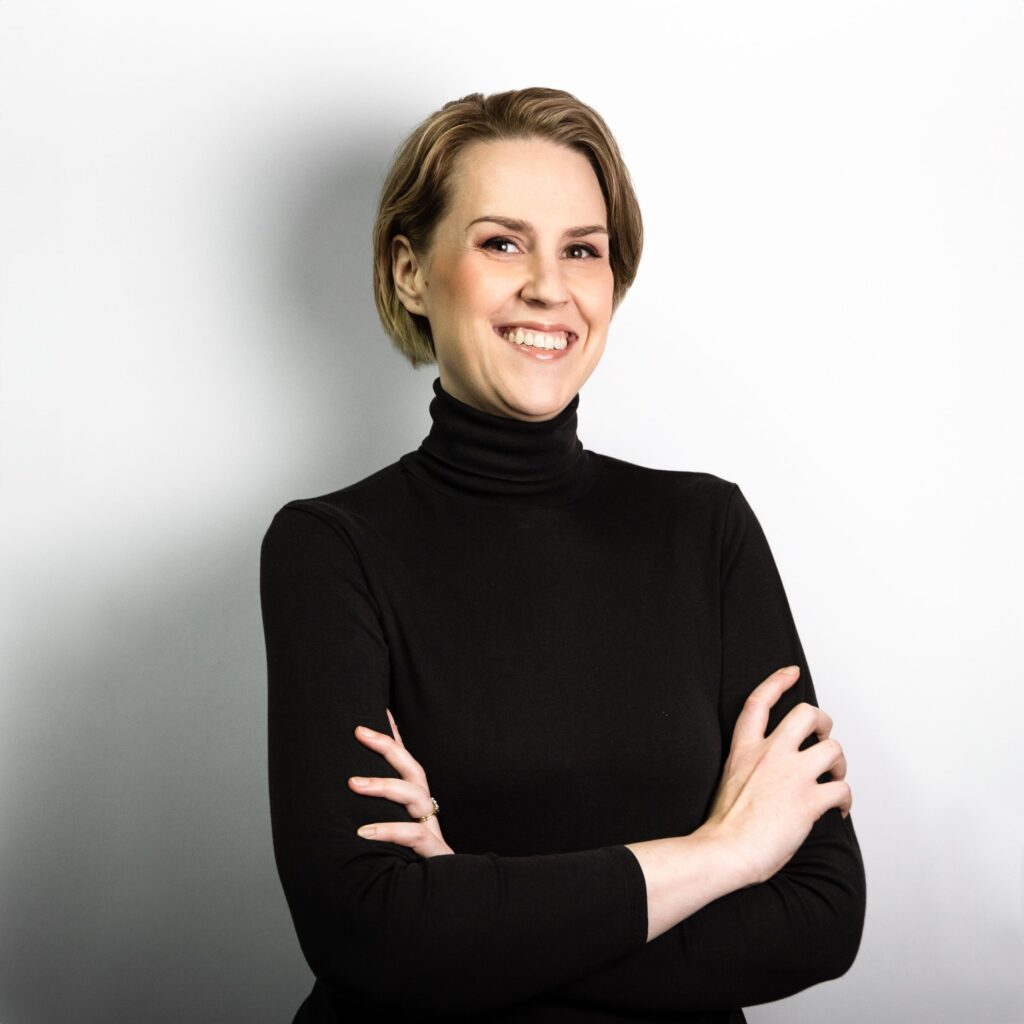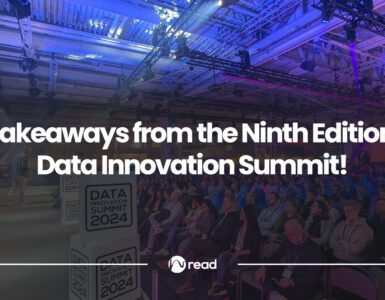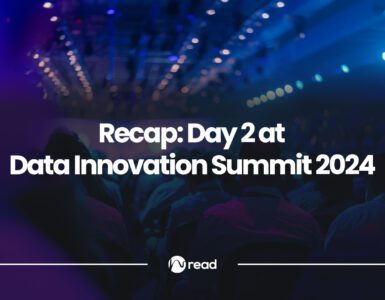In this interview, we had the chance to speak with Tove Mylläri, AI Innovation Lead at Yle, Finland’s national public broadcasting company. Tove is a long-standing technology, and innovation professional, a keynote speaker and the host of Yle’s AI Demo Event.
At the recent Nordic Women in Tech Awards, she was the winner of the Innovator of the Year Award 2023. She also received the WomanITy award in 2022 for her work in tech. Furthermore, Tove will be presenting more insights on “Digital twins and synthetic voices can tell stories 24/7” at the 9th annual Data Innovation Summit in Stockholm this April.
Hyperight: Can you tell us more about yourself and your organization? What are your professional background and current working focus?


Tove Mylläri: I work at Yle – Finnish Broadcasting Company, which is Finland’s national public service media company. I’m based in Helsinki, but we have several regional offices all around Finland. Yle produces content and services for audiences in equal conditions regardless of their residence status, wealth, age, or gender. I’ve worked here for a bit over two years. Before joining Yle, I was a Senior IT Consultant and coach for almost a decade, working for several well-known consultancies here in Finland. I’ve always worked with multidisciplinary teams that work to solve complex problems or have created new innovations. I won The WomanIT award in 2022 and Nordic Women in Tech – Innovator of the Year award in 2023.
For the past year, I’ve worked with large scale innovation projects and AI innovations. In January, I became an AI Innovation Lead for Yle Innovations. I focus on maintaining Yle’s AI experiment portfolio, expanding our partner network, and supporting and enabling AI experiments within Yle.
Hyperight: During the Data Innovation Summit 2024, you will share more on “Digital twins and synthetic voices can tell stories 24/7”. What can the delegates at the event expect from your presentation?
Tove Mylläri: I always have a glimmer of hope and a forward-looking attitude in my talks because, for me, it is the only way going forward. This presentation is no different. I’ve gathered the best and most exciting experiments we’ve done at Yle with digital twins and synthetic voices. I will also give our learnings and insights on how we’ve measured the successes of the experiments and what we are planning on doing in the future. I always share my own perspective on things and always to provoke new thoughts and ideas in my audiences.
Hyperight: AI literacy and the upbringing of AI-native children is a topic you’re passionate about. Could you elaborate on the importance of AI literacy in society, especially for children? How does it impact their upbringing and future skills development?
Tove Mylläri: AI literacy is the ability of a person to understand how artificial intelligence technically works, how they can be an active agent in working with AI, and how they can critically examine the content created by AI. Thus, AI literacy is the ability to analyze AI operations, create things with it, interpret what it produces, and express one’s own opinions and participate in discussions about AI.
Increasing AI literacy is the best way to reduce false and mystical notions about what AI is. It is also the most effective way to reduce the hype surrounding the subject and ground the discussion. By increasing AI literacy, we move towards a world where the use of AI becomes commonplace and the unreasonable expectations surrounding it diminish. If a person possesses good skills in AI literacy, they can use AI according to their own terms and needs. The use of AI should not be something separate and sporadic but integrated into daily life.
Children that are small now or are being born can be called AI-natives. They grow up in a world where AI has always been part of their everyday lives. Just like digital native children, like me, who grew up with the internet. But this is partly an illusion that you are just simply born into some era of technology to be native in using it.
If we think about who spends the most time with children and is responsible for their upbringing it’s their guardians or parents and educators. If they wish to give children a healthy relationship with technology, parents, guardians, and educators need to be involved with media and technology education. How they choose to do it is up to every family to decide. But it needs to be part of everyday life, not a separate thing that happens every now and then.
In Finland, we have media and technology education included in our national education plans. The foundations for developing skills and literacy in any area of technology are founded as early as in kindergarten or school. Early childhood education is also a very effective way to bridge the gap between skill levels in later life. If we start educating our kids about technology when they are teens, we are partly too late.
I’m very passionate about enabling children to grow future skills and literacy for using and understanding technology, including AI. I would argue it is one of the best ways to give them skills that can change their life for the better. And not just their lives but to make our societies better. I’m so passionate about this that I’ve studied social services and early childhood education for the past three years, and I’m graduating this year as Bachelor of Social Services with qualification to work in early childhood education. I’m not going to switch my career way from tech, rather I wanted to understand the world outside my social bubble a little better.
Hyperight: What are the potential benefits of AI in creative expression and learning, particularly for AI-native children, are there any risks involved?
Tove Mylläri: If we speak in general about possibilities, AI assisted creativity is something that everyone can enjoy and explore. AI-native children, who will grow up in an environment where AI is a fundamental part of their everyday lives, have unique opportunities for creative expression that were not available to previous generations.
AI democratizes creativity by leveling the playing field in terms of creative capabilities. It makes creative arts accessible to those individuals who may not have traditional artistic skills or be naturally talented. With AI, everyone can engage in creative activities and create art. This means that AI-native children can express themselves artistically without the need to master conventional skills first.
Creativity can also be enhanced in new ways for example creative writing and storytelling. For AI-native children, this could mean growing up with a broader range of creative outputs and experiences, expanding their imaginative capabilities.
And now we come to my personal favorite, AI personalized learning. With AI technology, we can adapt to individual learning styles and needs, providing personalized guidance and support in their learning endeavors. This could be beneficial particularly in educational settings, for example making learning a more inclusive experience for neurodiverse children and immigrants and other groups with special needs.
While the benefits are clear, it’s important to do research and understand the long-term effects of AI and technology on children’s development, cognitive skills, and social interactions. There are also ethical concerns we need to actively make, like privacy, and the role of AI in shaping educational, cultural, and artistic norms.
Hyperight: Has your organization done any projects or products to increase AI literacy in children?
Tove Mylläri: Yle Learning offers videos, podcasts, and articles to support studying. Topics include AI literacy, media and digital skills, languages, science, history, and nature. We also have Yle Uutisluokka / News Classroom where young people create news about their own topics. The goal of Yle News Classroom is to improve the media literacy of young people and increase their interest in society and current affairs.
We also have an education series called Älyä tekoälyä / Understand AI, it’s available in Finnish at Yle Learning’s website, containing a series of basic knowledge about how AI works and the logic behind it. Everything is done in a way that no matter what your age or background is, you can understand the subject. The series also contains competitions for school children to compete in “The most beautiful prompt” competition and for educators there is a separate competition where they can win an AI lecture for their school teaching faculty.
Hyperight: According to you, what AI trends can we expect in the upcoming 12 months?
Tove Mylläri: I would say that in 2024, the worst hype will come down, but AI technology and the models will keep evolving. Companies are really starting to think about how to turn this into action and profit and not all will succeed in this. But those who will, will reap the benefits as well. If I would end this with giving one “cool” thing that we might see, it could be wearables like Rabbit Tech´s R1 or the Rewind Pendant.
For the newest insights in the world of data and AI, subscribe to Hyperight Premium. Stay ahead of the curve with exclusive content that will deepen your understanding of the evolving data landscape.















Add comment